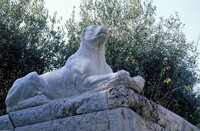Athens Kerameikos
unknown (Greek (ancient))

Download1A3-G-K-F13_cp.jpg (722.0Kb)
Alternative Title
Kerameikos
Date
-500--50Description
A marble dog, originally one of a pair, depicts the Precinct of Lysimachides; The Kerameikos, or potters' quarter [of ancient Athens] includes a major cemetery near two important gates. From the early 5th century BCE onwards the Kerameikos was traversed by a section of the city wall. This was originally built in great haste at the instigation of Themistokles, and many tombstones overturned during the Persian invasion (480-479 BCE) were incorporated in it. Despite repairs and rebuilding, in both the early and late 4th century BCE and in Roman times, its structure remained largely unaltered, consisting of a stone socle with a mud-brick superstructure. In the 4th century BCE a moat and outer wall were added in front of it, but the moat and much of the wall itself fell into disuse after the siege of Athens by Sulla in 86 BCE. Included in this section of wall are two major city gates: the Sacred Gate and the larger Dipylon, a little to its north-east. However, only the gates' lower courses remain. [Many of the tombstones, pottery and sculptures are now in the Archaeological Museum of Kerameikos]. Source: Grove Art Online; http://www.groveart.com/ (accessed 1/27/2008)
Type of Work
city gate; cemetery; excavation (site)Subject
architectural exteriors, death or burial, domestic life, genre, Cemeteries, Greek (ancient)
Rights
Rights Statement
Licensed for educational and research use by the MIT community only